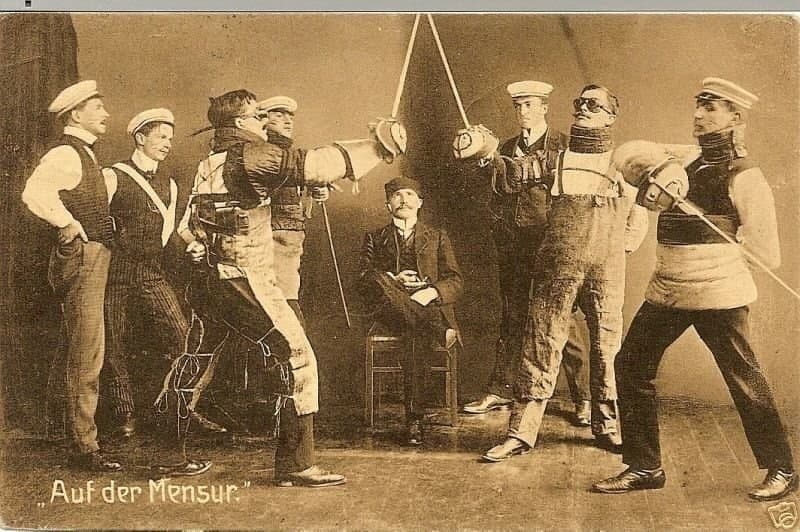Beaker fencing
Mensur Fechten
The name comes from the German phrase "Mensur fechten" — fencing in a confined space. What is it and what is it eaten with? Looking ahead, we will immediately indicate that this is one of the types of dueling that was originally used to resolve disputes among students of German universities. In the 14th century, university students in Germany were allowed to carry bladed weapons. And this applied not only to knives and daggers, but also to sabers with swords. The explosive mixture of this permission with the existing student secret and closed clubs led to more frequent cases of litigation between them. All the members of the club came to the proceedings and saw the duel of the most respected and authoritative members of their communities.
The rules of the duel changed over time. Starting with the option with an absolute lack of protection of the duelist and a long distance from each other between the disputants, and ending with later options with serious protection of non-overlapping body parts and a reduction in the distance between the two opponents. So, we will describe a later version, when both opponents could not move and tried to hit their attacker, standing in front of him at point-blank range.
Each of the duelists wore a special leather protective device for the shoulders, chest and neck. He wore glasses with a mesh over his eyes, as well as special protection for his nose. Two opponents faced each other within striking distance of a special saber called a schleger. This schleger was a sharp saber, with which a slashing movement of the hand could cause deep wounds on the opponent's face. Exactly. Only on the face. The primary target area is the face and nothing else.
The fight consisted of several rounds, in each of which the opponents had to deliver the agreed number of blows. This was followed by a short break, treatment of wounds and the continuation of the "static" fight. The loser was the one who had no strength left to continue the fight, or the one whose wounds were the most serious. After the end of the fight, right on the spot, doctors hurried to sew up the lacerations on the faces of the participants of the fight.
Sports competition
This type of duel was not accepted in other countries, where the inevitable result of a meeting between two offended people is the death or serious injury of one of the rivals. In menzure fencing, a lethal outcome is practically excluded. It is often equated with a sports competition. That is why, over time, the menzur ceased to be considered a kind of duel and grew into something similar to folk fun.
The fear of pain, danger, and possible serious injuries was instantly eradicated. For many German boys, menzur fencing was the last stage before the final formation of their masculinity. They had to pass this test and overcome their base fears of physical pain.
The material was selected by Nikolai Merzlyakov.
A source: https://stoneforest.ru/event/history/menzurnoe-fextovanie/


